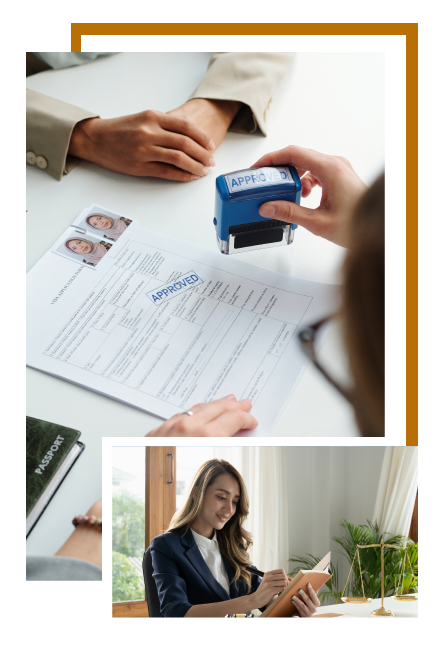FAQs

faq's
Frequently Ask Questions
A notary public is an official appointed by the state government to serve as an impartial witness in the signing of important documents and to administer oaths. The primary role of a notary public is to help prevent fraud and ensure that the parties involved in a transaction are who they say they are and are entering into agreements knowingly and willingly.
Fortunately, there are many ways to book appointments with us! You can schedule an appointments online, Call 855-675-9080, or you can send a message request via Email.
Please review all documents for the correct spelling of names and correct dates. All forms must be completed except where Notarial wording appears and of course signature lines. A Valid form of ID must be present at the time of signing.
TYPE OF DOCUMENTATION:
California permits Notaries to accept the following forms of identification, provided they are current or issued in the past 5 years:
• A California driver’s license or nondriver’s ID
• U.S. passport (or passport card)
• An inmate identification card issued by the California Department of Corrections and Rehabilitation if the inmate is in prison, or any form of inmate identification issued by a sheriff’s department if the inmate is in custody in a local detention facility California.
Also permits the following IDs, provided they include a photograph, signature, description of the person and a serial or ID number, and provided they are current or issued in the past 5 years:
• A driver’s license or official nondriver’s ID issued by a U.S. state.
• A Canadian or Mexican driver’s license issued by an appropriate public agency.
• A U.S. military ID A valid foreign passport from the applicant’s country of citizenship
• An employee ID issued by an agency or office of a California city, county, or city and county.
• An identification card issued by a federally recognized tribal government.
• A valid consular identification document issued by a consulate from the applicant’s country of citizenship that meets specific requirements.
(Note: Matricula consular cards issued by the government of Mexico do not meet California's statutory requirements.).
In Florida, the list of acceptable IDs includes the following. These IDs must be current or issued within the past five years and include a serial or other ID number:
• A Florida identification card or driver’s license
• A U.S. passport
• A foreign passport if it is stamped by the United States Bureau of Citizenship and Immigration Services
• Another state driver’s license or identification card issued by a U.S. state or a territory of the United States
• A Canadian or Mexican driver’s license or an identification card
• An identification card issued by any branch of the armed forces of the United States
• A veteran health identification card issued by the United States Department of Veterans Affairs
• An inmate identification card issued on or after January 1, 1991, by the Florida Department of Corrections for an inmate who is in the custody of the department.
• An inmate identification card issued by the United States Department of Justice, Bureau of Federal Prisons, for an inmate who is in the custody of the department.
• A sworn, written statement from a sworn law enforcement officer that the forms of identification for an inmate in an institution of confinement were confiscated upon confinement and that the person named in the document is the person whose signature is to be notarized.
• An identification card issued by the United States Bureau of Citizenship and Immigration Services.
Common types of documents that can be notarized include affidavits, powers of attorney, wills, deeds, contracts, and loan documents.

faq's
Frequently Ask Questions
A Notary Signing Agent (NSA) is a type of notary public who specializes in the notarization of real estate and loan documents.
Fortunately, there are many ways to book appointments with us! You can book appointments online, Call 855-675-9080, or you can send a message request via Email.
Please review all documents for the correct spelling of names and correct dates.
All forms must be completed except where Notarial wording appears and of course signature lines.
A Valid form of ID must be present at the time of signing.
California permits Notaries to accept the following forms of identification, provided they are current or issued in the past 5 years:
A California driver’s license or nondriver’s ID
A U.S. passport (or passport card)
An inmate identification card issued by the California Department of Corrections and Rehabilitation if the inmate is in prison or any form of inmate identification issued by a sheriff’s department if the inmate is in custody in a local detention facility
California also permits the following IDs, provided they include a photograph, signature, description of the person and a serial or ID number, and provided they are current or issued in the past 5 years::
A driver’s license or official nondriver’s ID issued by a U.S. state
A Canadian or Mexican driver’s license issued by an appropriate public agency
A U.S. military ID
A valid foreign passport from the applicant’s country of citizenship
An employee ID issued by an agency or office of a California city, county, or city and county
An identification card issued by a federally recognized tribal government
A valid consular identification document issued by a consulate from the applicant’s country of citizenship that meets specific requirements. (Note: Matricula consular cards issued by the government of Mexico do not meet California's statutory requirements.).
In Florida, the list of acceptable IDs includes the following. These IDs must be current or issued within the past five years and include a serial or other ID number:
A Florida identification card or driver’s license
A U.S. passport
A foreign passport if it is stamped by the United States Bureau of Citizenship and Immigration Services
Another state driver’s license or identification card issued by a U.S. state or a territory of the United States
A Canadian or Mexican driver’s license or an identification card
An identification card issued by any branch of the armed forces of the United States
A veteran health identification card issued by the United States Department of Veterans Affairs
An inmate identification card issued on or after January 1, 1991, by the Florida Department of Corrections for an inmate who is in the custody of the department
An inmate identification card issued by the United States Department of Justice, Bureau of Federal Prisons, for an inmate who is in the custody of the department
A sworn, written statement from a sworn law enforcement officer that the forms of identification for an inmate in an institution of confinement were confiscated upon confinement and that the person named in the document is the person whose signature is to be notarized
An identification card issued by the United States Bureau of Citizenship and Immigration Services
Common types of documents that can be notarized include affidavits, powers of attorney, wills, deeds, contracts, and loan documents.
A Notary Signing Agent (NSA) is a type of notary public who specializes in the notarization of real estate and loan documents.
A field inspector is an individual who conducts on-site inspections or assessments.
Yes! All of our Notary’s must go through yearly background tests, pass the state mandated Notary exam and of course have current bonds and E&O insurance through the state of business.
As a Mobile Notary service, we specialize in bringing our services to you. This might be your home, office, restaurant, nursing facility, hospital, airport, federal, state or county correctional building. You name it and we can be there. We primarily offer this extensive coverage in Florida and in California.
We accept all major Credit/Debit Cards, Company Checks, Zelle, and of course Cash. We can also provide invoicing upon request.
Our business is open 7 days a week to serve you. (weekend/holiday rates may be subject to additional mobile fees)
In order for a document from the United States to be used in another country, the document must be authenticated or “legalized”. This is done by having the document notarized and then having official seals from US government bodies as well as the Consulate or Embassy of the destination country placed on the document so that they can be recognized as a legal document outside the US. The procedures can vary, depending on the country where the document will be used.
Since we are a mobile notary service, we do not offer an on-site service at this time.
An Apostille (pronounced “ah-po-steel”) is a French word meaning certification. An Apostille is simply the name for a specialized certificate, issued by the Secretary of State. The Apostille, which contains a stamped red seal, is attached to your original document to verify it is legitimate and authentic so it will accepted in one of the other countries who are members of the Hague Apostille Convention. In 1961, many countries joined together to create a simplified method of “legalizing” documents for universal recognition. Members of the conference, referred to as the Hague Convention, adopted a document referred to as an Apostille that would be recognized by all member countries. Since October 15, 1981, the United States has been part of the 1961 Hague Convention abolishing the Requirement of Legalization for Foreign Public Documents. The Apostille Convention provides for the simplified certification of public (including notarized) documents to be used in countries that have joined the convention. Documents destined for use in participating countries and their territories should be certified by one of the officials in the jurisdiction in which the document has been executed. The Apostille Convention requires that all Apostille’s be numbered consecutively, with individual numbers applied to each Apostille issued. The recognized standard Apostille contains a seal and 10 mandatory references: name of country from which the document emanates, name of person signing the document, the capacity in which the person signing the document has acted, in the case of unsigned documents, the name of the authority that has affixed the seal or stamp, place of certification date of certification, the authority issuing the certificate, number of certificate, seal or stamp of authority issuing certificate and signature of authority issuing certificate.
- Acknowledgments
Purpose: To verify that the signer of a document personally appeared before the notary, was identified by the notary, and acknowledged signing the document freely and willingly. Common Uses: Real estate transactions, deeds, powers of attorney, and other documents requiring a formal acknowledgment.
- Jurats
Purpose: To verify that the signer of a document personally appeared before the notary, was identified by the notary, and swore or affirmed that the contents of the document are true. Common Uses: Affidavits, depositions, and other sworn statements.
- Jurats
- Oaths and Affirmations
Purpose: To administer an oath or affirmation where the individual swears (or affirms) to the truthfulness of a statement or document.
Common Uses: Testimonies, affidavits, and written statements. - Copy Certifications
Purpose: To certify that a copy of a document is a true and accurate reproduction of the original.
Common Uses: Educational diplomas, passports, driver’s licenses, and other important documents (Note: Not all states allow notaries to perform copy certifications) - Signature Witnessing
Purpose: To witness the signing of a document, verifying that the signer personally appeared before the notary and was identified.
Common Uses: Consent forms, contracts, and other documents that require a witness. - Verification of Fact (Verification Upon Oath or Affirmation) Purpose: To verify that the factual information contained in a document is true to the best of the signer's knowledge. Common Uses: Verifying personal or business information, applications, and other factual statements.
Agreements Patent Applications Bills of Articles of Incorporation Power of Attorney Birth Certificates Articles of Organization Proof of Ownership Death Certificate Certificate of Good Standing References and Job Certifications Deeds, Titles, Assignments Free Sale Certificate Trademark Divorce Degree Distributor Agreement Adoption Documents Marriage Certificate General Corporate Agreements Affidavits Police Records GMP Certificate Identity Document / Passports Private Documents Letter of Invitation Identity Document / Passports Proof of Citizenship/Residency Certificate of Analysis Background Checks School Diploma(s) / Transcript(s)
Yes, you can mail or drop off your documents, and we'll take care of the rest. Should you have any questions or concerns at all, please don’t hesitate to reach out to us at any time!
Apostilles issued in accordance with the requirements of the Convention must be recognized in the country where they are to be used. Apostilles may only be rejected if and when:
their origin cannot be verified (i.e., if and when the particulars on the Apostille do not correspond with those in the register kept by the Competent Authority that allegedly issued the Apostille); or
their formal elements differ radically from the Model Certificate annexed to the Convention. While an Apostille should conform as closely as possible to the Model Certificate annexed to the Convention, in practice Apostilles issued by different Competent Authorities vary in design, size and colour as well as in any additional elements that may be included on the Certificate.
Such variations in appearance are not a basis for refusal of an Apostille. Failure to affix an Apostille to the public document Apostille. The mere fact that an Apostille has been affixed by a method that differs from the method(s) employed by the country where it is to be used is not a reason for the rejection of the Apostille. Additional text on an Apostille outside the box with the 10 numbered standard informational items is not a basis for rejection of an Apostille. ‘Apostille Certificates’ issued by countries that are not party to the Convention must be rejected in all other States as being contrary to the Convention.
The processing time varies depending on the issuing authority and country requirements.
An Apostille only certifies the origin of the public document to which it relates: it certifies the authenticity of the signature or seal of the person or authority that signed or sealed the public document and the capacity in which this was done. An Apostille does not certify the content of the public document to which it relates. Apostilles are not grants of authority and do not give any additional weight to the content of underlying documents. An Apostille may never be used for the recognition of a document in the country where that document was issued – Apostilles are strictly for use of public documents abroad. It is up to the country where the Apostille is to be used to decide how much weight to give to the underlying public document. An Apostille only certifies the origin of the public document to which it relates, never the content of that document.
Visit the California Department of Justice website for instructions on obtaining a background check.
Visit the Florida Department of Law Enforcement website for instructions on obtaining a background check.
What is a Notary Public ? A notary public is an official appointed by the state government to serve as an impartial witness in the signing of important documents and to administer oaths. The primary role of a notary public is to help prevent fraud and ensure that the parties involved in a transaction are who they say they are and are entering into agreements knowingly and willingly.
A field inspector is an individual who conducts on-site inspections or assessments.
Yes! All of our Notary’s must go through yearly background tests, pass the state mandated Notary exam and of course have current bonds and E&O insurance through the state of business.
As a Mobile Notary service, we specialize in bringing our services to you. This might be your home, office, restaurant, nursing facility, hospital, airport, federal, state or county correctional building. You name it and we can be there. We primarily offer this extensive coverage in Florida and in California.
We accept [list accepted payment methods].
Our hours are Monday to Sunday 24/7
Common types include acknowledgments, jurats, oaths, and affirmations.
Our Location is Florida and all California
An apostille is a certification verifying the authenticity of a document for international use.
Consulate legalization is the process of certifying documents for use in a foreign country through the consulate or embassy.
Examples include birth certificates, marriage certificates, and diplomas.
Yes, you can mail or drop off your documents, and we'll take care of the rest.
The processing time varies depending on the issuing authority and country requirements.
An apostille certifies the authenticity of documents for use in countries that are part of the Hague Apostille Convention.
Visit the California Department of Justice website for instructions on obtaining a background check.
Visit the Florida Department of Law Enforcement website for instructions on obtaining a background check.

faq's
Frequently Ask Questions
Other important documents for estate planning may include:
- Last Will and Testament
- Living Will (also known as a Healthcare Directive)
- Trust documents (Living Trust, Irrevocable Trust, etc.)
- HIPAA Authorization Form
- Beneficiary Designations

